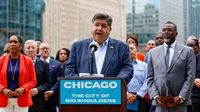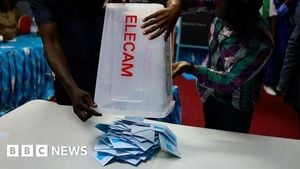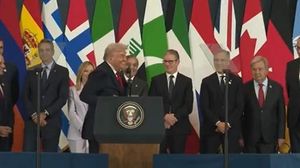In a summer marked by heated debates over public safety and the reach of presidential power, the nation’s largest cities have found themselves at the center of a legal and political firestorm. President Donald Trump’s recent moves to deploy federal troops and National Guard personnel to urban centers have not only reignited questions about the balance of federal and state authority, but also set off a wave of resistance from governors, mayors, and legal scholars across the country.
On August 26, 2025, Tennessee Governor Bill Lee made his position clear: he is not considering deploying National Guard personnel to Tennessee cities for law enforcement, nor is he accepting federal troops to patrol Memphis, despite a presidential order that would allow such action. "We have no plans to put the National Guard there now," Lee told reporters, according to the Tennessee Lookout. The governor emphasized that Tennessee has already made "significant investments" to combat crime in Memphis, including spending $150 million in grant funds and increasing Tennessee Highway Patrol enforcement with help from the Tennessee Bureau of Investigation, U.S. Marshals Service, and local agencies.
Backing up his stance, Lee cited a report he received that same morning showing crime is down 15% in Memphis over the past year. While he didn’t specify the exact time frame, Lee pointed to these improvements as evidence that the state’s targeted efforts are working. "We’ve had no conversations with the president or his team about National Guard in Memphis. We have targeted our efforts and our communications with those federal agencies. I even spoke this morning with an FBI official about our efforts in Memphis and Shelby County and how they’re working. So that’s where we are today," Lee said.
Despite President Trump’s executive order signed on August 25, 2025—creating a quick strike force to go into the nation’s largest cities to combat crime—Governor Lee stressed, "There are no circumstances that currently exist that we believe warrant that, so we’re not talking about that right now. It’s not a consideration for us right now." While Lee did recently activate Guard personnel for logistical and clerical work with Immigration and Customs Enforcement, and sent state troops to Washington, D.C., last week at Trump’s request, he made it clear that military enforcement in Tennessee’s cities is a non-starter for now.
Illinois, meanwhile, has become another flashpoint in the national debate. On August 27, 2025, Illinois Governor JB Pritzker issued a stern warning: the state "will not stand idly by" if President Trump deploys the National Guard to Chicago in response to crime. "Unlike Donald Trump, we keep our promises. We will not stand idly by if he decides to send the National Guard to intimidate Chicagoans," Pritzker posted on X, formerly known as Twitter. The governor’s comments came amid an ongoing feud with Trump, as the federal government weighs whether to send troops to Chicago.
Pritzker has consistently rejected the notion that Chicago faces a crime emergency, accusing Trump of "attempting to manufacture a crisis, politicize Americans who serve in uniform, and continue abusing his power to distract from the pain he is causing working families." He insisted that "the safety of the people of Illinois is always my top priority," and that "there is no emergency that warrants the President of the United States federalizing the Illinois National Guard, deploying the National Guard from other states, or sending active duty military within our own borders." Pritzker characterized the potential federal deployment as "unconstitutional" and "un-American," arguing, "Donald Trump wants to use the military to occupy a U.S. city, punish its dissidents and score political points. If this were happening in any other country, we would have no trouble calling it what it is—a dangerous power grab."
Chicago Mayor Brandon Johnson, also a Democrat, echoed Pritzker’s concerns and cited data showing that violent crime has declined in the last year, with homicides and robberies dipping by more than 30%, and shootings dropping by nearly 40%. However, Johnson acknowledged that crime is still up compared to 2021, according to Chicago police statistics. "The problem with the President's approach is that it is uncoordinated, uncalled for, and unsound," Johnson said. "Unlawfully deploying the National Guard to Chicago has the potential to inflame tensions between residents and law enforcement when we know that trust between police and residents is foundational to building safer communities."
President Trump, for his part, has not shied away from public confrontation. On August 26, 2025, he wrote on Truth Social, "A really DEADLY weekend in Chicago. 6 DEAD, 27 HURT IN CRIME SPREES ALLOVER THE CITY. Panic stricken Governor Pritzker says that crime is under control, when in fact it is just the opposite. He is an incompetent Governor who should call me for HELP. Mayor Johnson is no better. Make Chicago Great Again!" Trump’s remarks reflect his broader strategy of using federal resources to address what he describes as urban crime crises, a move he has already implemented in Washington, D.C., where hundreds of federal agents and National Guard troops have been deployed as part of a federal takeover to reduce crime.
But the president’s actions have sparked not only political but also legal resistance. On August 22, 2025, University of Pennsylvania Carey Law professor Claire Finkelstein and the Center for Ethics and the Rule of Law filed an amicus brief in Newsom v. Trump, challenging Trump’s June 7 order to place the California National Guard under federal control. The brief, joined by the National Institute of Military Justice and other legal scholars, argues that this executive action undermines federalism, violates the Posse Comitatus Act—which restricts the use of federal troops in policing roles—and threatens the First and Fourth Amendment rights of American citizens.
"There are very significant concerns when the U.S. military is deployed in a domestic as opposed to a foreign context," Finkelstein told The Daily Pennsylvanian. She warned that the lawsuit could set a dangerous precedent for future attempts to federalize state National Guards, including potential troop deployments to cities like Chicago and Philadelphia. Finkelstein noted, "Newsom v. Trump is the canary in the coal mine, because, as we saw, it was followed by Trump using the D.C. National Guard to deploy in the District of Columbia for the stated purpose of addressing homelessness, beautifying the city, [and] controlling crime—despite the fact that crime in DC is at an all time low," citing a roughly 27% drop in crime since 2024.
The three-day bench trial in Newsom v. Trump concluded on August 13, 2025, before Judge Charles Breyer, with a ruling expected in the coming weeks. Although the Department of Justice opposed the filing of Finkelstein’s brief, the court granted leave to file on August 25. Finkelstein stressed the importance of the judiciary’s role in checking executive power, especially as federal courts have historically been reluctant to tie the hands of the President regarding troop deployments.
As legal challenges proceed and political rhetoric intensifies, the question of how best to balance public safety, federal authority, and constitutional rights remains unresolved. With crime rates fluctuating and the threat of federal intervention looming over major cities, the coming weeks promise to be pivotal in defining the boundaries of presidential power and the future of civil-military relations in America.




